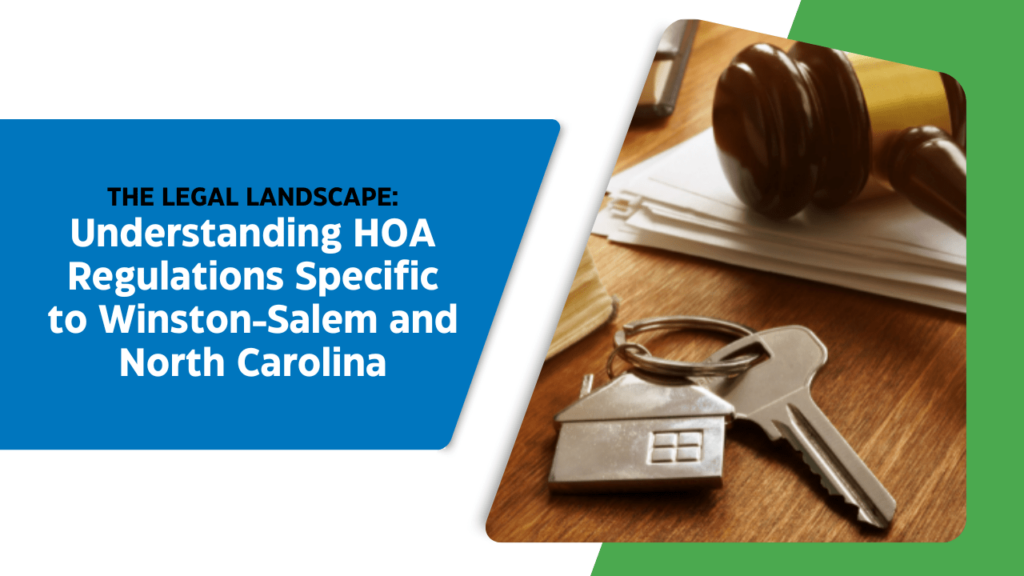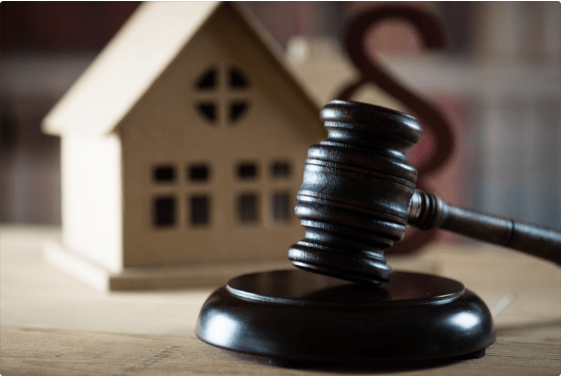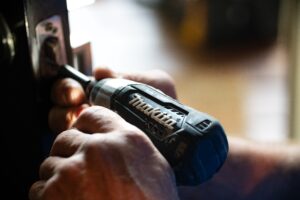
The city of Winston-Salem does not have any formal legal requirements on associations and how they are formed, managed, and given authority by their members. On the city website, Winston-Salem does encourage associations to develop a mission statement, a set of bylaws, and a structure for holding and documenting meetings.
The HOA regulations that an HOA in Winston-Salem must follow stem from a set of very specific state laws. North Carolina sees HOAs as common entities within residential communities. They’re given the power to enforce rules and regulations, and to effectively manage common areas.
The bylaws and other governing documents that you hold within your HOA will determine how you operate and act. The state law requires that you provide information on the management structure, voting procedures, and membership dues.
North Carolina HOA laws are established to provide a framework for the creation, operation, and management of these associations. We’re taking a look at some of the specific laws that govern your HOA in North Carolina and why it’s so important that you’re compliant with all of these legal regulations.
How to Set Up an HOA in Accordance with North Carolina Law

In North Carolina, the establishment of an HOA requires some clear and specific steps. Before you develop the bylaws and hold elections for board members, there needs to be a Declaration of Covenants, Conditions, and Restrictions (CC&Rs). This is a legally binding document according to the laws of North Carolina, which outlines the community standards, rights, and responsibilities of the HOA and its members.
For a Winston-Salem HOA, this document must be recorded with Forsyth County, otherwise it won’t be enforceable. Here’s a look at the basic documents that support any HOA.
|
Articles of Incorporation and Bylaws Nearly every HOA we have encountered is established as a non-profit organization, and that means you need to file your Articles of Incorporation with the North Carolina Secretary of State. These articles legally create the HOA, establishing its name and purpose. The Articles of Incorporation will also provide the names of the initial board of directors. Bylaws are also created to establish the day-to-day operations of the HOA. Most bylaws will talk about organizational structure, meeting procedures, rights and duties of members, and the processes for elections. |
Responsibilities of Board Members As you begin to elect and welcome new board members onto your HOA leadership team, remember that they are responsible for acting as the governing body of the association. That includes complying with all HOA laws in the state. Board members are also called upon to uphold the bylaws and the CC&Rs. There are funds that need to be ethically and transparently managed, and the common areas throughout the community will be their responsibility, too. Board members serve the interests of the association, making decisions on behalf of members. |
Legal Framework for HOAs in North Carolina In North Carolina, homeowners associations (HOAs) are subject to some serious laws and regulations. These laws are in place and enforced in order to establish the scope of an HOA’s powers and responsibilities, ensure compliance with federal regulations, and define the legal foundation upon which these entities operate. You’ll need some legal support for your HOA, whether that’s a lawyer or a professional HOA management company in Winston-Salem with an understanding of how the laws are applied. |
Important State Laws Governing HOAs in North Carolina

Let’s take a look at two specific laws that are unique to North Carolina and have a lot to do with how you set up, govern, and organize your HOA.
- North Carolina Planned Community Act
This law applies to communities established after January 1, 1999.
It’s codified under Chapter 47F of the North Carolina General Statutes. This law sets forth the creation, management, and powers of HOAs in this state. It includes requirements around the declaration of covenants, bylaws, and the enforcement of community rules. Homeowners associations are required to comply with this Act when managing common areas, collecting assessments, and handling dispute resolutions.
- North Carolina Nonprofit Corporation Act
Your HOA’s nonprofit status puts it under the legal requirements of the North Carolina Nonprofit Corporation Act, or Chapter 55A. This Act also has something to say about the governance of HOAs, including board meetings, member voting rights, and record-keeping. As nonprofit entities, HOAs must adhere to state-specific requirements for corporate behavior, which include fiduciary duties and financial management practices.
Federal Laws Impacting HOAs in Winston-Salem
Let’s not forget the relevant federal laws.
Most important is the Fair Housing Act (FHA), prohibits discrimination in housing-related activities on the basis of:
- Race
- Color
- National origin
- Religion
- Sex
- Familial status
- Disability
The Americans with Disabilities Act (ADA) mandates reasonable accommodations for individuals with disabilities in public and private areas, and that includes your HOA.
Accommodating People with Disabilities in Winston-Salem HOA Communities
For homeowners and residents with physical, intellectual, or emotional disabilities, the Persons with Disabilities Protection Act and Fair Housing Laws mandate that HOAs in North Carolina make reasonable accommodations in any policies, practices, or services when such accommodations may be necessary to provide that person an equal opportunity to use and enjoy a home or a building.
|
HOAs are also required to allow residents with disabilities to make reasonable modifications to their homes and common areas at the resident’s expense. This might look like dedicated parking or wheelchair ramps. |
Ensuring accessibility of facilities and addressing the specific needs of residents with disabilities is a legal obligation for all community associations. Compliance with these requirements is essential to avoid lawsuits and federal legal claims. But, it’s more than that. Your HOA should work to create a community where all residents are given equal opportunities.
Another federal law to know and comply with is the Fair Debt Collection Practices Act (FDCPA), which protects homeowners from abusive debt collection practices by HOAs or their agents when seeking to collect overdue assessments.
Laws Around Financial Management in North Carolina HOAs
HOAs in North Carolina are required to collect assessments and dues, and there are regulations and legal protections in place to ensure the appropriate handling of homeowner money and avoid fraud.
|
Assessments and Dues North Carolina HOA may charge regular assessments to provide the necessary funds to pay for managing community expenses. They are typically set annually and are mandatory for all members. The North Carolina Planned Community Act has strict protocols for the imposition and increase of these assessments. Make sure your HOA is aware of them and compliant. HOAs also have the power to levy fines and penalties when there are violations of community rules. |
Managing HOA Finances Accounting has to be transparent. HOAs are expected to manage their finances by adhering to both federal and state laws. In North Carolina, this includes adhering to the guidelines set by the North Carolina Nonprofit Corporation Act. An HOA must maintain assets, including common areas and facilities. They must also manage and make available the funds required for their upkeep. Sound financial management includes creating a budget, managing expenses, and ideally, working with a professional management company in Winston-Salem. |
Recordkeeping and Surpluses Extra money in the HOA accounts is always good news, and any surplus funds in an HOA’s budget at the end of a fiscal year must be addressed in a manner consistent with North Carolina’s laws and the association’s governing documents. Typically, an HOA will bank any surplus into the reserves or return it to members. Complete and accurate financial records must be maintained, detailing all income and expenditures. Members have the right to access these records, and they must remain transparent and accessible. |
Access to Association Records

HOA members have the right to see financial reports, meeting minutes, and any other documents of record. You should have a process in place whereby a homeowner can make that request.
In any decision that requires member input, such as changes to governing rules or board elections, members are granted the right to vote and before they vote, they may want to review the records on file within the association.
Records and Transparency in North Carolina
- In North Carolina, HOAs are required to maintain and allow inspection of association records.
- HOAs are required by law to keep detailed financial records which homeowners have the right to inspect. The North Carolina Nonprofit Corporation Act provides guidance on how these records should be managed and the extent of access granted to homeowners.
To foster transparency, North Carolina legislation outlines reporting requirements for HOAs. According to the Fair Housing Act, these requirements are supplemented by state laws such as the North Carolina Debt Collection Act. Additionally, homeowners’ associations established after January 1, 1999, must adhere to the North Carolina Planned Community Act, which includes provisions for the management and dissemination of records to its members. These laws ensure that homeowners are well-informed about the operations and financial state of their HOA.
What Can HOAs in Winston-Salem Legally Require from Their Members?
With rights come responsibilities. These are some of the obligations you can require your members to heed:
|
Paying Dues Members must pay dues for maintenance and management. These can be collected monthly, quarterly, or annually. |
Compliance Members must be aware of and comply with all HOA rules, including those that impact personal homes. |
Participation Homeowners are not legally required to participate in meetings and elections. Encourage them, anyway. |
Maintenance and Habitability Requirements
 North Carolina HOAs are required to manage and maintain common areas. They’re also allowed to set clear restrictions on property modifications. Understanding and compliance with these regulations ensure the uniformity and aesthetics of the community. It also contributes to higher property values.
North Carolina HOAs are required to manage and maintain common areas. They’re also allowed to set clear restrictions on property modifications. Understanding and compliance with these regulations ensure the uniformity and aesthetics of the community. It also contributes to higher property values.
Amenities and common areas must be safe and accessible. Whether we’re talking about pools, parks, fitness centers, sports courts, or a clubhouse, maintenance and services should be covered by HOA fees and assessments.
Common areas will also include landscape areas, green spaces, walkways, playgrounds, and gathering points for residents and their guests. Communicate the maintenance responsibilities and usage restrictions to all members.
What Does the Law Say about Restrictions and Permissions for Modifications?
Homeowners who want to make modifications to their property must adhere to the HOA’s architectural guidelines. These restrictions are put in place to maintain a uniform appearance and may cover aspects ranging from paint color to solar panels to yard signs and landscaping choices.
Homeowners must request approval from the HOA architectural committee before starting any property modifications, ensuring compliance with community guidelines. This is pretty standard, and legal challenges will rarely allow a homeowner to violate the rules and regulations of their association without facing consequences.
Homeowners do have the right to opt-out of certain restrictions if allowed by the HOA’s governing documents, though this is typically limited and often does not extend to common areas or external modifications that affect the overall look and feel of the neighborhood.
In North Carolina, homeowners’ associations (HOAs) are subject to specific procedures for dispute resolution and enforcement of community rules. Residents can raise complaints to their HOA board when issues arise. It is typically encouraged to seek an amicable resolution through internal channels first. If these initial efforts do not yield results, mediation becomes a valuable tool. In some cases, North Carolina law may require mediation prior to litigation to avoid clogging the courts with issues that can be resolved through less adversarial means.
Voting on Changes in HOAs: How to Do So in Compliance with Legal Regulations

Amendments are sometimes made to governing documents in North Carolina, and HOAs are bound by specific statutes when it comes to amending governing documents including bylaws and deed restrictions.
|
Changing HOA Bylaws and Regulations To modify an association’s bylaws and regulations, North Carolina HOAs almost always require a specific majority, such as a 2/3 majority vote from the membership. This process allows communities to adapt to changes and address new challenges. |
Deed Restrictions Deed restrictions define the use, appearance, and maintenance standards of properties within the community. Adherence to the North Carolina Planned Community Act is required when making amendments to these restrictions. The law emphasizes the importance of transparency and member approval in the amendment process. |
Special Topics in HOA Governance in North Carolina
What about political signs? Flags?
What if someone wants to run a daycare out of their home or an animal shelter in their backyard?
Those are specific examples, but in the area of HOA governance, community concerns that were never anticipated often arise. Understanding these rules is vital to ensuring compliance and harmony within the neighborhood.
Here are some relevant examples.
- Flags
Homeowners will feel strongly about displaying flags. These can be any flag type, such as the U.S. flag, the North Carolina state flag, military flags, or other banners that hold personal significance and promote specific passions. However, North Carolina HOAs can legally regulate the size, placement, and number of flags displayed at a residence to maintain a uniform community aesthetic.
- Political Signs
Political expression is especially common during election years, and yard signs may pop up throughout your community. North Carolina HOAs have the legal standing to establish clear guidelines on the time frame for displaying political signs, such as limiting signs to election periods. An HOA can also set consistent size and placement restrictions to balance individual expression with community standards.
- Solar Panels
This is a newer area of the law for North Carolina HOAs. The state’s support for renewable energy solutions has impacted HOA governance. Solar panels are often a visible commitment to environmental sustainability and an attempt to conserve resources and reduce energy bills. While HOAs can regulate the placement and manner of installation, they cannot outright prohibit the installation of solar panels if they meet established state provisions.
Legal Support for HOAs in North Carolina
 HOAs in North Carolina have legal support and resources available to navigate the complexities of these laws and regulations. Seeking legal advice from a qualified attorney and utilizing state and federal resources ensures compliance with relevant statutes.
HOAs in North Carolina have legal support and resources available to navigate the complexities of these laws and regulations. Seeking legal advice from a qualified attorney and utilizing state and federal resources ensures compliance with relevant statutes.
Work with an HOA attorney, especially if you run into a question you’re not qualified to answer. When a member of an HOA or the HOA itself requires legal assistance, finding an experienced HOA attorney is important. Check in with the North Carolina Bar Association, which offers a directory of attorneys. Many of them have experience with HOA law.
You can also talk to your Winston-Salem HOA property manager. They’ll have resources, connections, and relationships in place that can help you navigate any kind of legal issue.
State and federal resources are also available to HOAs. At the federal level, the U.S. Department of Housing and Urban Development provides guidance on fair housing and discrimination laws, which are applicable to HOAs. North Carolinians can also access state-specific information through the following entities:
- North Carolina Department of Justice. This agency can answer any homeowner questions about their rights and responsibilities.
- Community Associations Institute, North Carolina Chapter. This organization collects resources and educational materials on NC HOA laws and best practices.
Stay up to date on relevant legislation. If you’re struggling with your own legal responsibilities as an HOA, reach out to us at Capstone Realty Consultants. We can help you and your homeowners make sense of what you need to know.
